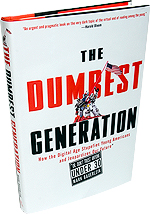« Good Saturday: Paris Spring 2010 | Main | O Rare Duke: Hated Hoops Tribe Triumphs in Hostile Hoosier Heartland. »
April 05, 2010
"...an incomplete person and a negligent citizen."
Is the client rep or GC you're going to lunch with a Marshall or Fulbright scholar? Well, do not drag people under 30 along. They think Flaubert is a food, Marx a chain of movie theaters, and Disraeli my second favorite Cream album.
If it sounds like I am complaining again, I am. I've really had it. As "bright" and "educated" as they are, the vast majority of the younger hires I've met, known, worked with, or worked against in the last decade--in my firm's shops or in other workplaces--are at best semi-literate. And, yes, semi-literate, the more I think about it, is going a bit too far.
It is not their fault, maybe. I don't care how they got this way. We don't need to probe for reasons or cast blame. These people just need to change.
Me? No, I don't need to change to accommodate them--any more than I "need" (a) a lobotomy, (b) to watch any reality TV, or (c) to snort solvents and cleaning products.
The smarter and bolder ones will "change" just to keep up--just as I once needed to re-learn two foreign languages, needed to pass the California bar exam twenty years out of law school, or needed to change my life on a couple of occasions. But I cannot do it for them.

Newsweek/F. Martin Ramin
How do they get "there"? I really don't care how. But it's certainly all out there in front of them. Even if you are young, and are part of the new batch that was never taught to think or lead on its own, you can at least find the tools.
This is America in 2010, Jack. We don't ban books. And you are allowed here to talk about what you learn. Or to disagree with what you've read or heard. Our best educational resources (like books) are mainly either free or cheap.
The ideas: Democracy. What were the Greeks, or Martin Luther, thinking about, anyway? Why do people still talk about them? The world's long transition from an agricultural to industrial economy. Regulating industries. Well, should we? And how much? What did Ralph Nader do? What are the responsibilities (or not) of developed nations' governments. What are the Chinese doing off and on throughout history when no one is looking? The institution of the family has served humans very well. But does marriage make sense anymore? (And, just for fun, why is Keith Richards still alive?)
Church versus State. You've heard of that one. And the place of organized religion in a world where people who know better will kill--or at least remain very small-minded for their entire life--to support a set of ostensibly harmless and even common sense ideas of an insular Christian or Muslim sect.
What are the Great Books, anyway? How did they change things? If you're a corporate lawyer, do you really need to know anything about a dead guy named Sinclair Lewis?
In the U.S., you can talk to people about these ideas, developments, works, innovators, and authors. You can argue. Recreate the old arguments. Make brand new ones. Whether or not they are established concepts, or institutions, you can challenge them--and have 99.75% odds that no one will throw you in jail. But you need to get the "vocabulary".
Sorry to get "old" on you--but lots of people fought and died all over the world for centuries so you (especially if you're an American) could learn and do all this stuff. And very recently.
We were hoping you'd be a citizen of the world, and maybe be poised to lead a bit, and to do that you need to know something about the history of your new "small" world, this country (Americans tend to isolate themselves so you have to reach way out), and the ideas and events that got everyone this far without literally blowing it all up.
About 30 centuries is what you need to catch up on. The world itself, like America, is actually pretty young. Lots of smart people--both dead and still living--have outlined and distilled a lot of what's happened so far for you. Please find their work. Maybe you can even get started with your favorite search engine.
But I cannot teach anyone on this Earth--or where I work--to have self-respect. Or to appreciate at once both the career value and more critical "quality-of-life" value of an education. Or to prize attaining the hard-won state of "being well-rounded".
I can forget about the expense in hires that do not work out. We'll take that hit. It's always worth it to try. Down through the ages, humans--especially those forged in pain, trauma or struggle--are generally and consistently amazing; they are always worth a gamble.
But what comes into my world over and over again in recent years are hardly the Renaissance men and women many people expect of lawyers and young professionals. It's getting worse. No pain, trauma or struggle, of course--all of which could have helped them. No gospel, no gumption, no soul, and no education at all. No book-learning. Or even character-developing.
They are embarrassing, lacking both the vocabulary and bare-bones knowledge of the main threads of Western culture. It's as if they speak "digital" but do not care to learn and speak English. I experienced this last week, and the week before; it will come my way again this week.
Is the GC you're going to lunch with a Marshall, Fulbright or a Rhodes scholar? Do not drag people under 30 along. They think Flaubert is food, Marx a chain of movie theaters, and Disraeli my second favorite Cream album (after "Wheels of Fire").
And knowing these things is more than a social grace. Lawyers analyze and construct arguments. Reading or using, for instance, a legislative history for a bill in Congress or before a state legislature may require background in the American political process and its history, knowledge of past and current American public policy debate, and even appreciation of English and much older (i.e., Roman, Greek, tribal) ideas, traditions, methods and practices. Some examples of the latter are split-sampling in environmental law (English), the notion of popularly electing judges (German tribal and mid-19th century U.S.) and the notion of arbitration (the Ancient World).
Other lawyers and clients--not all, but many--expect younger people to have such knowledge and instincts. Like me.
If you know of any "mutant" exceptions to the syndrome--young lawyers, paralegals, researchers, assistants (I expect everyone in the legal profession to have modicum of cultural sophistication or at least be stretching that way)--have them e-mail me or reach me through the comments (which we won't publish).
Finally, the last chapter--Chapter 6, entitled "No More Culture Warriors"--of The Dumbest Generation (2009), the best-seller by Emory English professor Mark Bauerlein, is the most moving 31 pages I have read about why being steeped in the older and enduring ideas, events and works of the last 2500 years--especially the last 250 years of the American experiment--is required and minimum stuff for educated young people to have deep in their bones, minds and souls.
And so they will never embarrass you at lunch.
I don't agree with everything in Bauerlein's book, but would still have been proud to have written much of it. See these excerpts from Chapter 6:
[I]f you ignore the traditions that ground and ennoble our society, you are an incomplete person and a negligent citizen.
It isn’t funny anymore. The dumbest generation cares little for history books, civic principles, foreign affairs, comparative religions, and serious media and art, and it knows less.
Careening through their formative years, they don’t catch the knowledge bug, and tradition might as well be a foreign word. Other things monopolize their attention—the allure of screen, peer absorption, career goals.
They are latter-day Rip Van Winkles, sleeping through the movements of the culture and events of history, preferring the company of peers to great books and powerful ideas and momentous happenings. From their ranks will emerge few minds knowledgeable and interested enough to study, explain, and dispute the place and meaning of our nation.

Posted by JD Hull at April 5, 2010 11:46 PM